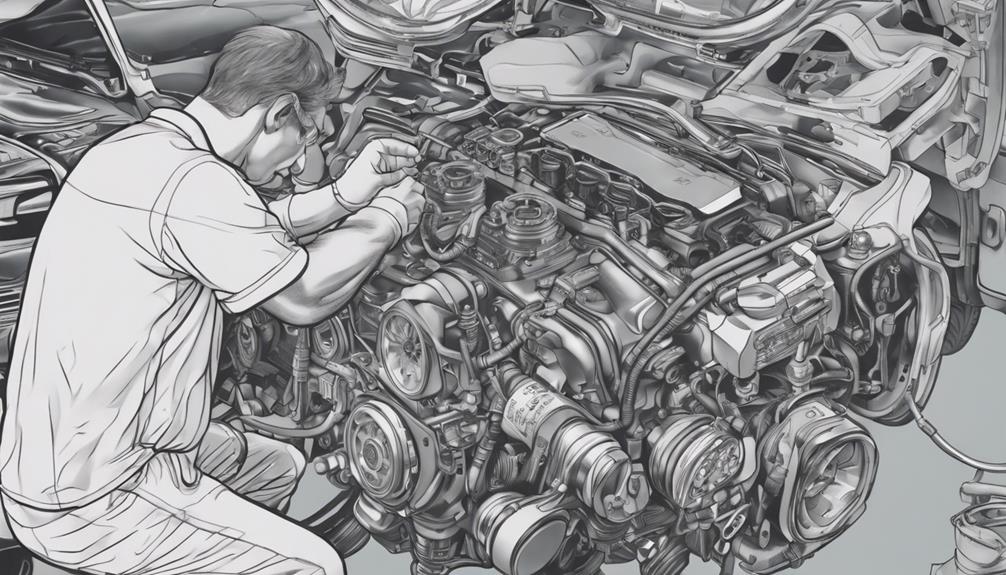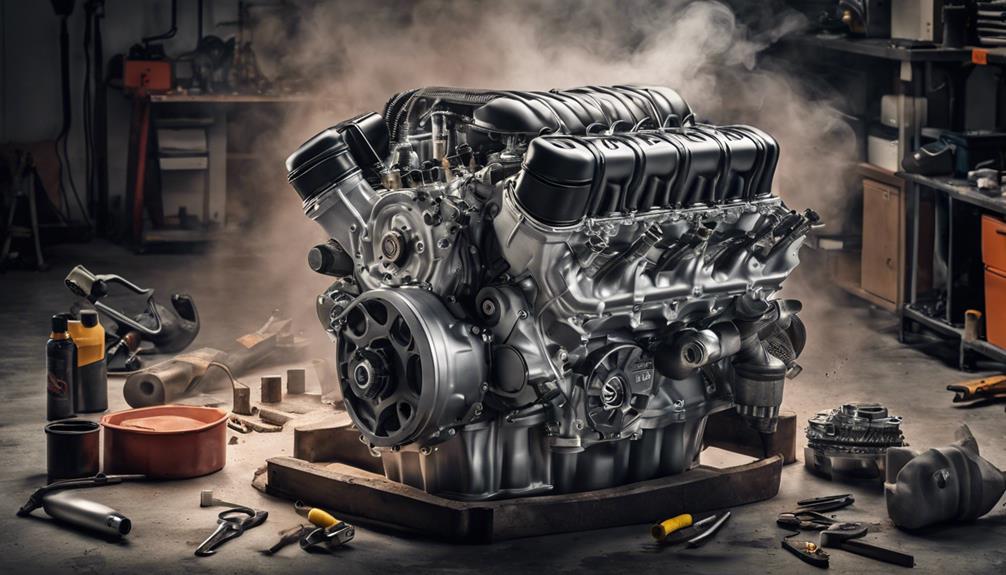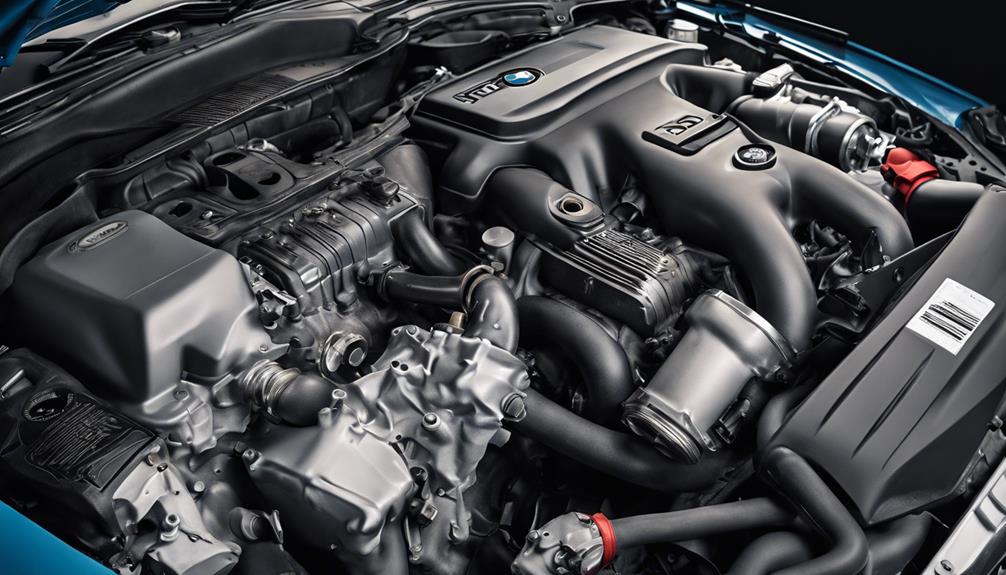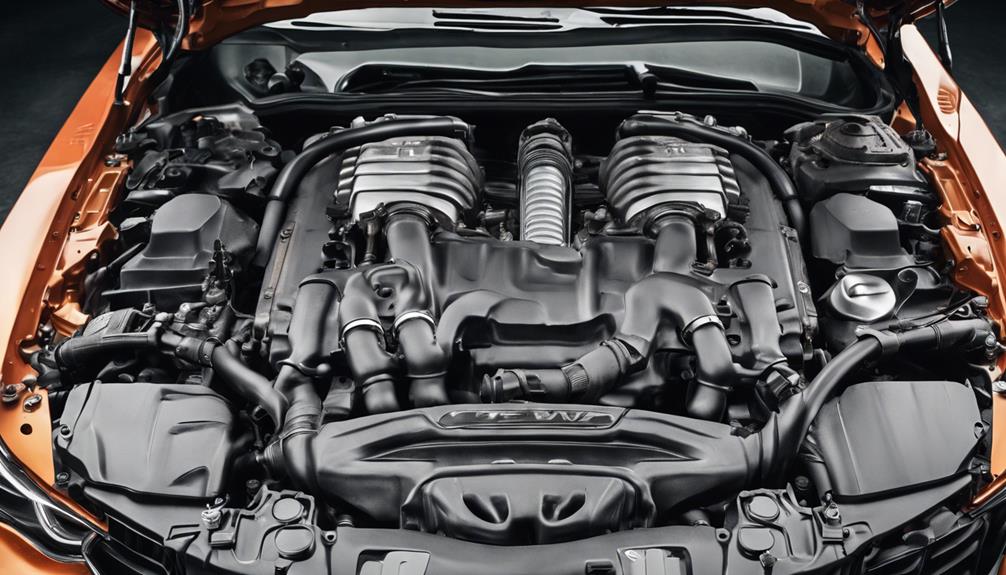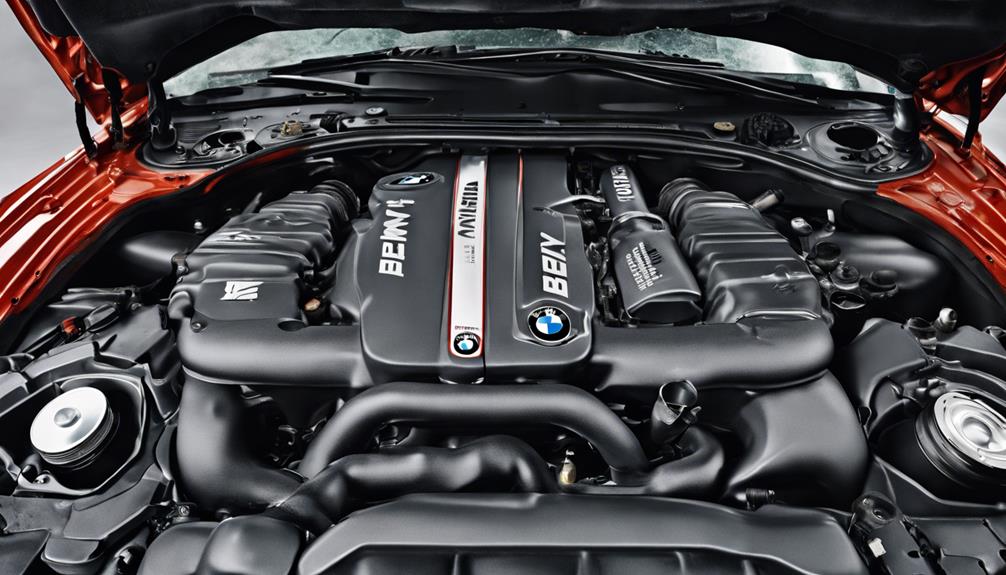If you're experiencing BMW B38 engine problems, watch out for timing chain wear and intake valve deposits. Ensuring proper oil maintenance is crucial for excellent engine performance and longevity. Remember, taking care of these issues promptly can save you from bigger headaches down the road.
Key Takeaways
- Timing chain wear is a significant issue, leading to misfires and engine failure.
- Intake valve deposits can cause performance issues, requiring manual cleaning or additives.
- Carbon buildup affects valve efficiency, necessitating periodic cleaning and high-quality fuel.
- Correct oil selection and regular changes are crucial for engine longevity and turbo health.
- Service history checks are vital when buying used B38 cars for maintenance adherence.
Common Issues With B38 Engines
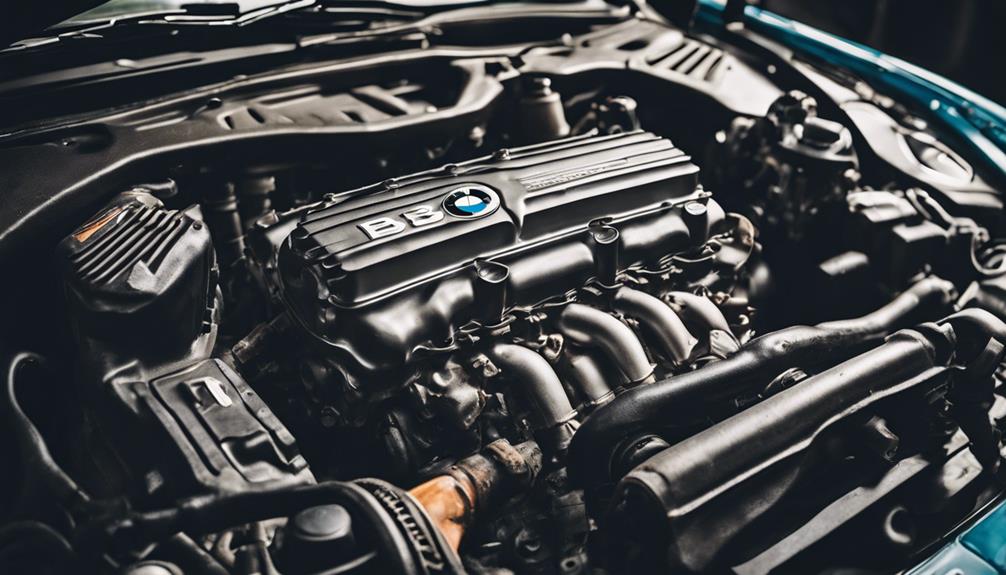
If you're considering a vehicle equipped with a B38 engine, be aware of the common issues that may arise to make sure you're prepared for potential challenges ahead. One significant concern with B38 engines is the timing chain.
The timing chain is vital for synchronizing the engine's components, but in some B38 engines, this part has shown a tendency to wear prematurely. This can lead to engine misfires, rough idling, or even complete engine failure if not addressed promptly.
To avoid being caught off guard by this issue, regular maintenance checks are essential. Ensuring that the timing chain is inspected and replaced according to the manufacturer's recommendations can save you from costly repairs down the road.
Stay vigilant and proactive when it comes to the timing chain in your B38 engine, and you'll be better equipped to enjoy the freedom of the open road without unexpected setbacks.
Intake Valve Deposits and Solutions
If you've noticed diminished engine performance, misfires, or rough idling in your BMW B38 engine, intake valve deposits could be the culprit. These deposits, often caused by impurities in fuel, can wreak havoc on your engine's efficiency.
Stay ahead by considering manual cleaning, walnut blasting, or using additives to keep those valves deposit-free.
Valve Deposit Causes
Intake valve deposits in the BMW B38 engine can impede performance and efficiency, necessitating proactive maintenance measures for optimal function. With direct injection engines like the B38, fuel fails to clean the valves, leading to carbon buildup and potential issues.
These deposits restrict airflow, hamper engine efficiency, and may even result in misfires or rough idling. To combat this, periodic manual cleanings by professionals are essential to remove the carbon buildup. Additionally, using specialized fuel additives can help prevent and reduce intake valve deposits in direct injection engines.
Ensuring regular maintenance practices, such as using high-quality fuel and scheduling intake valve cleanings, is vital to prevent problems related to valve deposits in the B38 engine.
Cleaning Methods
To combat intake valve deposits in the BMW B38 engine effectively, exploring advanced cleaning methods like walnut blasting or chemical cleaners is crucial for maintaining peak performance and efficiency. Here are some key points to ponder:
- Walnut Blasting: Utilizing walnut shells blasted onto the intake valves can efficiently remove stubborn carbon deposits without causing damage.
- Chemical Cleaners: Certain chemical cleaners specifically designed for intake valve deposits can break down and dissolve the buildup, restoring ideal airflow.
- Regular Maintenance: Implementing a routine cleaning schedule can prevent excessive carbon buildup, ensuring consistent engine performance.
- Improved Efficiency: By keeping intake valves clean, you can enhance engine efficiency, reduce the risk of misfires, and prolong the lifespan of your BMW B38 engine.
Preventive Maintenance Tips
Incorporating fuel additives with detergents into your maintenance routine can help prevent intake valve deposits in your BMW B38 engine. These additives work to clean the valves, guaranteeing top engine performance.
Regularly inspecting and cleaning the intake valves is vital to prevent carbon buildup, maintaining efficiency. For stubborn deposits, consider walnut blasting as an effective solution.
Using quality synthetic oils can also minimize carbon buildup and keep your engine running smoothly. Adhering to manufacturer recommendations for oil change intervals is essential in preventing excessive carbon buildup.
Importance of Correct Oil Usage
Using the right oil for your BMW B38 engine is crucial. It's like giving your car the VIP treatment it deserves.
Oil Type Compatibility
Proper oil selection is paramount for maintaining the BMW B38 engine's longevity and performance. When it comes to oil type compatibility, here are four key points to take into account:
- Using the correct long-life oil is essential for turbo engines like the BMW B38, ensuring ideal lubrication and protection.
- The B38 engine demands high-quality oil to uphold its performance standards and prevent premature wear and tear.
- Incorrect oil type usage can result in increased engine deposits, potentially leading to long-term damage and decreased efficiency.
- Regular oil changes with the recommended grade are vital to keep the B38 engine running smoothly and efficiently, promoting its overall health and longevity.
Maintenance Schedule Adherence
Ensuring your BMW B38 engine's longevity hinges on the meticulous adherence to its maintenance schedule, particularly in the domain of correct oil usage. The maintenance schedule acts as a roadmap for the well-being of your engine, guiding you on when to change the oil to keep it running smoothly.
By following this schedule diligently, you're proactively safeguarding your engine against potential damage and ensuring peak performance. Correct oil usage isn't just a suggestion but a necessity to prevent issues like intake valve deposits that could compromise the engine's efficiency.
Turbo Engine Longevity Tips
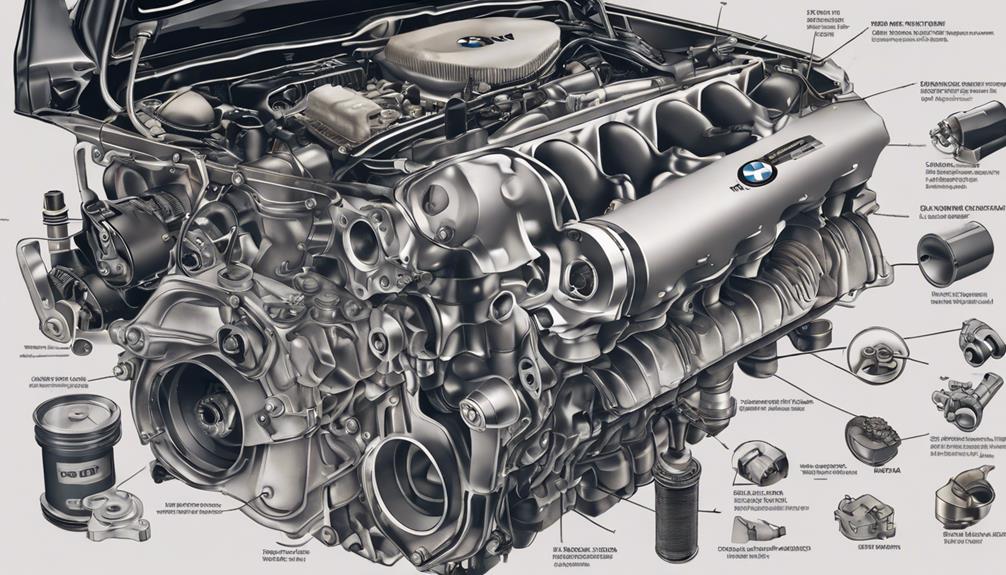
For turbo engine longevity, prioritizing the use of high-quality, long-life oil recommended for turbo engines is essential. This simple step can go a long way in guaranteeing the health and performance of your turbocharged engine.
Here are four tips to help you maximize the lifespan of your B38 turbo engine:
- Regular Oil Changes: Changing the oil before the specified intervals can prevent potential damage and keep your engine running smoothly.
- Intake Valve Maintenance: Direct injection engines like the B38 may develop intake valve deposits over time. Regular manual cleaning can help uphold engine efficiency.
- Service History Check: When buying a used car with a B38 engine, make sure it has a proper service history to ensure maintenance compliance and care.
- Follow Manufacturer Guidelines: Adhering to the manufacturer's recommended oil change intervals and maintenance schedules can notably extend the life of your B38 turbo engine.
Oil Change Intervals for B38 Engines
To maximize the lifespan of your B38 engine, maintaining consistent and timely oil change intervals is essential for peak performance and longevity. Oil change intervals play an important role in preserving the health of your engine, especially in turbo engines like the B38.
Extended oil change intervals should always be coupled with high-quality oil to prevent potential damage and guarantee the longevity of your engine. It's recommended to adhere to regular oil changes before the specified intervals to keep your engine running smoothly.
When purchasing a used car with a B38 engine, checking the service history for adherence to oil change schedules is crucial to guarantee proper maintenance. Remember, direct injection engines like the B38 may develop intake valve deposits over time, necessitating manual cleaning.
High-Quality Oil for Engine Health
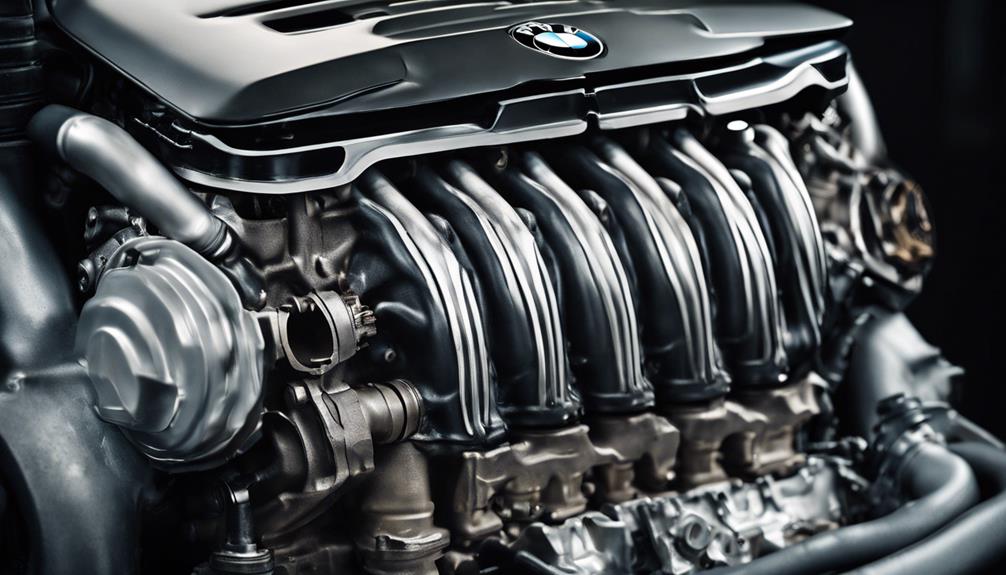
Opting for high-quality oil is paramount to maintaining the health and performance of your BMW B38 engine. When it comes to engine oil, here are four essential points to keep in mind:
- Correct Oil Type: Using the recommended long-life oil specifically designed for BMW B38 engines is essential. This guarantees proper lubrication and helps prevent premature wear and damage to vital components.
- Turbocharger Care: High-quality oil plays a major role in the health of turbocharged components in the engine. Proper lubrication is vital for the turbocharger to function efficiently and avoid potential issues.
- Longevity Extension: Opting for the appropriate oil grade and type can greatly extend the lifespan of your engine and its various components. It's a smart investment in the long-term health of your BMW B38 engine.
- Preventive Maintenance: Regular oil changes using the correct oil can prevent sludge buildup and ensure optimal performance of your B38 engine. It's a simple yet effective way to keep your engine running smoothly and efficiently.
Considerations When Buying Used B38 Cars
Considering the importance of engine health in BMW B38 vehicles, evaluating key factors when purchasing a used B38 car becomes essential for a smart investment. One vital aspect to scrutinize is the service history. By checking for regular oil changes and maintenance records, you can confirm that the engine has been well taken care of.
Look out for signs of intake valve deposits, especially in direct injection engines like the B38, as they may require manual cleaning. Additionally, verify that the correct long-life oil has been used, particularly in turbo engines, to prevent potential damage.
Given the significance of extended oil change intervals and the use of high-quality oil for the best engine longevity, prioritize vehicles with a well-documented service history when making your decision. This won't only provide you with peace of mind but also increase the likelihood of a smoother and more reliable driving experience in the long run.
Service History Impact on Engine
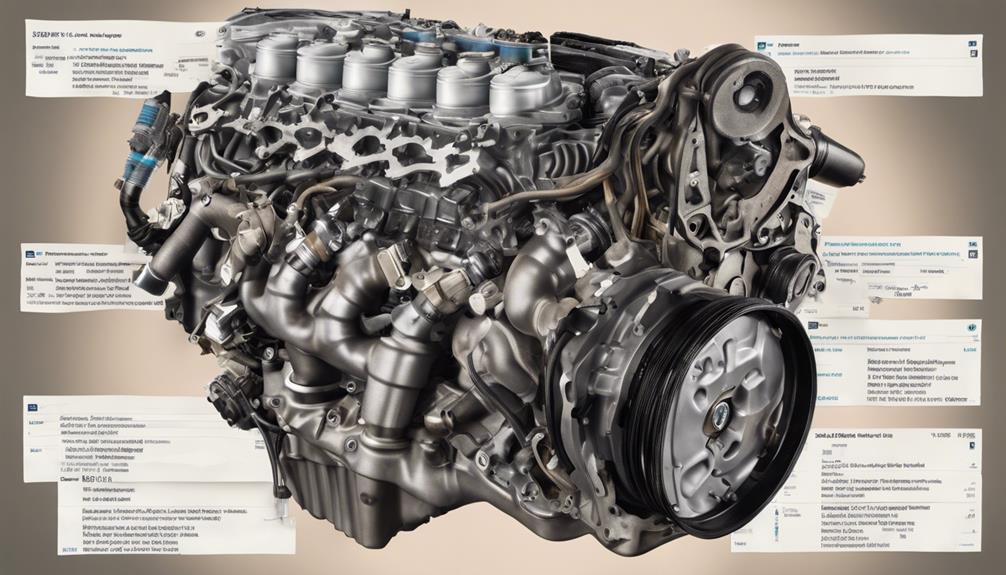
Evaluating the service history of a BMW B38 engine offers valuable insights into its maintenance and potential performance issues. Here's why it matters:
- Preventive Maintenance: Regular servicing plays an important role in preventing major problems and ensuring the longevity of your B38 engine.
- Neglected Maintenance Signs: Incomplete or irregular service records may signal neglected maintenance, hinting at potential hidden issues that could surface later.
- Resale Value Impact: The service history of a vehicle with a B38 engine can have a substantial impact on its resale value, highlighting the importance of keeping up with maintenance.
- Used Car Assessment: Checking the service history before buying a used car with a B38 engine is a smart move. It allows you to assess the overall condition of the engine and make an informed decision about your purchase.
Recommended Maintenance Practices
To maximize the performance and longevity of your BMW B38 engine, prioritize following recommended maintenance practices diligently.
Using the correct high-quality oil is essential for turbo engines like the B38, ensuring their longevity. Regularly cleaning intake valve deposits in direct injection engines is vital to prevent potential issues down the road.
Opting for premium oil is a must for extended oil change intervals in B38 engines, safeguarding their health. When contemplating purchasing a used car with a B38 engine, make sure to prioritize vehicles with a detailed service history for reliability assurance.
Additionally, it might be wise to contemplate more frequent oil changes than specified to give your engine that extra bit of care it deserves. By staying on top of these B38 engine maintenance practices, you can enjoy a smooth driving experience while keeping your engine in excellent condition.
Frequently Asked Questions
Is the B38 Engine Reliable?
Yes, the B38 engine is generally reliable, earning praise for its smooth operation with automatic transmission. However, keep an eye out for early crank bearing issues and potential performance dips in hot weather conditions.
Who Makes the B38 Engine?
BMW, a renowned German automotive company, manufactures the B38 engine. Introduced in 2013, it's part of BMW's modular engine family known for efficiency and performance. With compact size and advanced tech, the B38 offers power and fuel efficiency.
Is the 1.5 BMW Engine Reliable?
Yes, the 1.5 BMW engine is reliable for your daily needs. It offers a good balance of power and efficiency. Keep in mind that performance may vary based on your driving style and conditions. Enjoy the ride!
Is BMW 3 Cylinder Engine Good?
Yes, BMW's 3-cylinder engine is impressive. With advanced tech like Valvetronic and direct injection, it offers a great power-to-liter ratio. Maintenance is key for longevity. Enjoy the ride with this efficient powerhouse.





